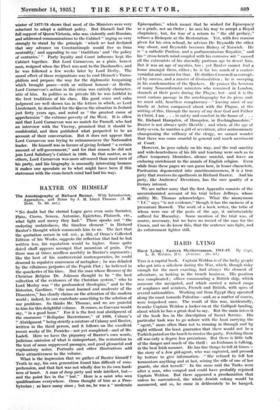BAXTER ON HIMSELF
"No doubt but the eternal Logos gave even unto Socrates, Plato, Cicero, Seneca, Antonine, Epictetus, Plutarch, etc., what light and mercy they had." There speaks out "the enduring undatedness, the timeless element" in Richard Baxter's thought which commends him to us. The fact that the quotation occurs in vol. xxi., p. 562, of Orme's Collected Edition of his Works, suggests the reflection that had he but written less, his reputation would be higher. Some quite dated chaff appears amongst that mountain of grain. For there was at times needless acerbity in Baxter's arguments ; like the best of his controversial contemporaries, he could descend to repulsive coarseness of metaphor ; he was deluded by the villainous perjuries of the Popish Plot ; he believed in the quackeries of his time. But the man whose Reasons of the Christian Religion Dr. Johnson thought to be "the best collection of the evidences of the. Christian system," who to Lord Morley was "the profoundest theologian," and to the historian, Gardiner, "the most learned and moderate of the Dissenters," has clearly claims on the attention of the modern world ; indeed, he can contribute something to the solution of our probleins. So thinks Mr. Thomas, and we are grateful to him for this delightful volume. It comes, as Guevara would say, "in a good hour." For it is the first real abridgment of the enormous " Reliquiae Baxterianae,"- of 1696, Calamy's "Abridgment " being-strictly a mixture of Calamy and Baxter, Written in the third person, and it follows on the excellent recent works of Dr. Powicke—not -yet completed—and of Mr.. Well. Here we have the piquancy of Baxter's own words, judicious omission of What is unimportant, the restoration to the text of some suppressed passages, and good glossarial and explanatory notes. Portraits and other illustrations add their attractiveness to the volume.
What is the impression that we gather of Baxter himself ? Truth to say, his own generation found him difficult of com- prehension, and that fact was not wholly due to its own hard- ness of heart. A man of deep piety and wide intellect, but— and the point lies in the "but." Here is a saint who sees qualifications everywhere. Orme thought of him as a Pres- byterian.; so have many since ; but no, he was a "moderate Episcopalian," which meant that he wished for Episcopacy. as a grade, not an Order ; he sees his way to accept a Royal chaplaincy, but, for fear of a return to ." the old prelacy," refuses a Bishopric at the Restoration. Yet, with five reasons given for his own refusal, he advises Dr. Reynolds the other way about, and Reynolds becomes Bishop of Norwich. He , is "a catholic Puritan, and a parliamentarian Royalist," and his "cross-bench mind coupled with his corrosive wit" caused all the extremists of his shrewdly partisan age to desert him. But it was an age of mystics, too ; yet Baxter cannot find a, home amongst them, either ; he is far too much of a contro- versialist and casuist for that. He dislikes Cromwell as corrupt- ed by success, and a master of dissimulation ; he is sweeping in his condemnation of the Quakers. He praises the heroism of many Nonconformist ministers who remained in London, staunch at their posts during the Plague, but—and it is the most curious passage in the autobiography for its pious and, we must add, heartless complacency—" leaving most of my family at Acton compassed about with the Plague, at the writing of this, through the mercy of my dear God and Fat her in Christ, I am . . . in safety and comfort in the house of . . . Mr. Richard Hampden, of Hampden, in Buckinghamshire. Baxter is not always quite likeable ; and when, at the age of forty-seven, he marries a girl of seventeen, after acrimoniously championing the celibacy of the clergy, we cannot wonder that there was some scandal in general and much merriment at Court.
However, he goes calmly on his way, and the real sanctity and wide-heartedness of his life and teaching were such as to efface temporary blemishes, silence scandal, and leave an enduring enrichment to the annals of English religion. Even while from these pages we can guess how, in lesser characters, Puritanism degenerated into sanctimoniousness, it is a true piety that receives its apotheosis in Richard Baxter. And his piety, like Andrewes' Devotions, has the rare quality of a literary interest.
We are rather sorry that the first Appendix consists of the uncorroborated account of his trial before Jeffreys, whose ability Mr. Thomas acknowledges. What the anonymous " I.C." says "is not evidence," though it has the raciness of a - premature Boswell. The work of a hack writer, the tribe of whom were one of the pests of the age, it unfortunately sufficed for Macaulay. Some mention of the trial was, of course, necessary, but we have no record of the case for the Crown, and we do know this, that the sentence was light, and its enforcement lighter still.


























































 Previous page
Previous page